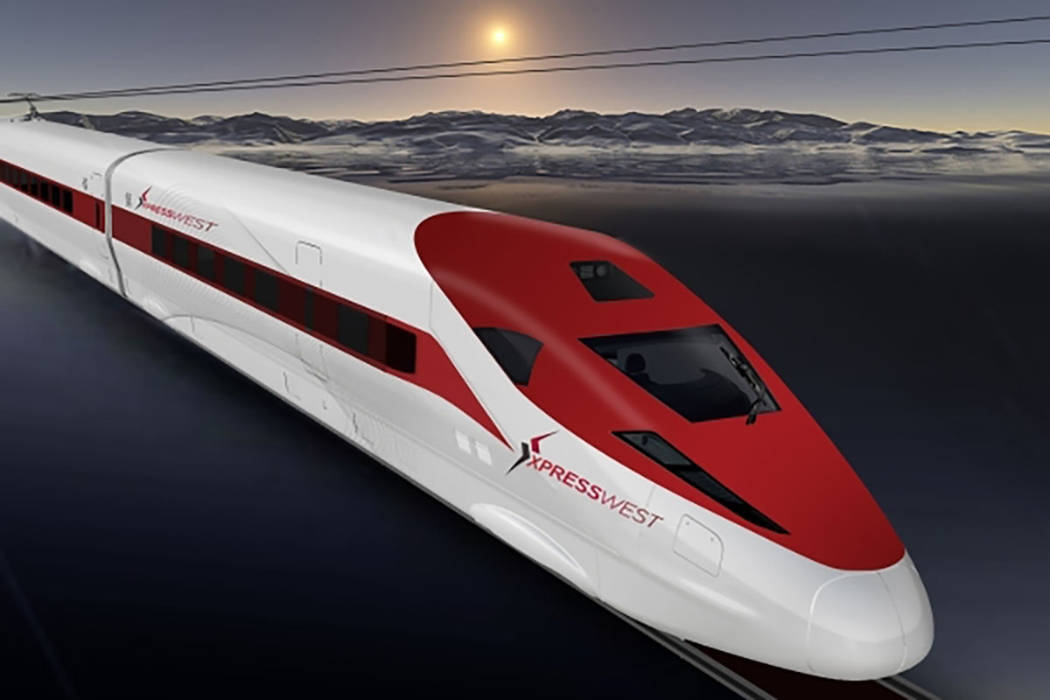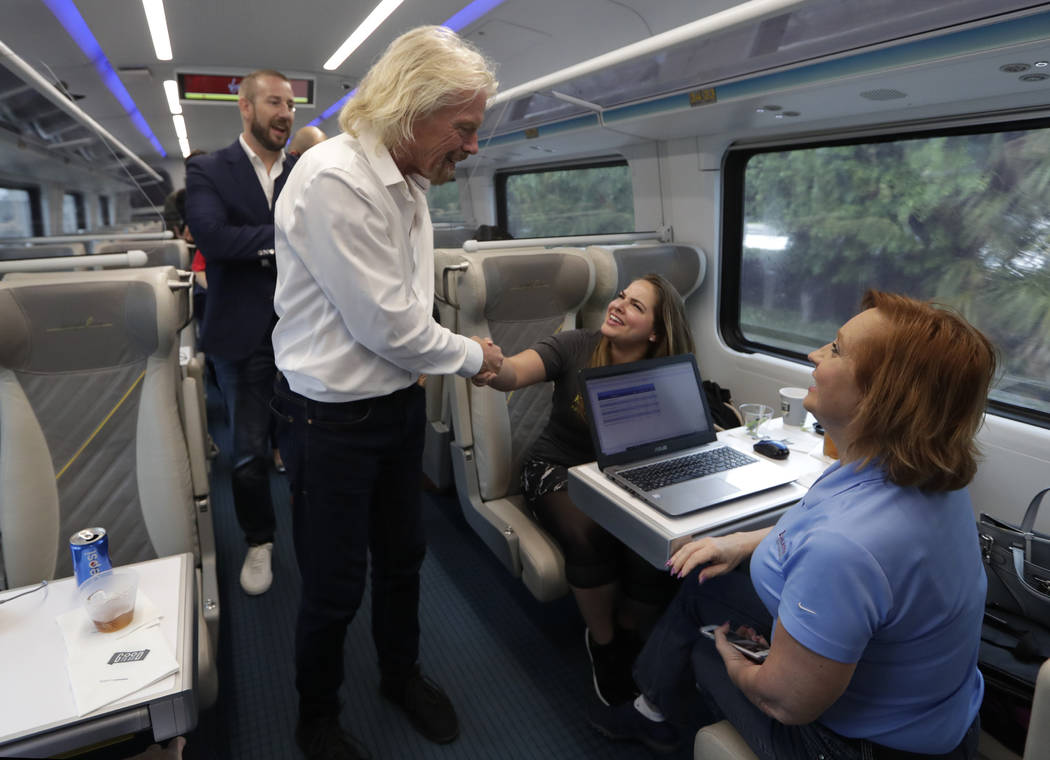Virgin Trains seeking $800M in bonds for high-speed rail project
Virgin Trains is looking to finally get the long-talked about high-speed train project between Las Vegas and Southern California on track by applying for tax exempt bonds from the two states it will run in.
Under the name of its parent company, Florida East Coast Industries, Virgin Trains USA is seeking authorization from California authorities to sell $600 million in tax-exempt private activity bonds, according to the California State Treasurer’s Office.
The company also is seeking approval from Nevada to sell another $200 million in bonds, according to Terry Reynolds, deputy director of the Nevada Department of Business and Industry..
With that authorization, Virgin Trains would become eligible for federal grant funding in what amounts to a 4-to-1 match, Reynolds said.
So, Virgin can leverage the $800 million in bonds into $3.2 billion toward the project, he said.
The rest of the estimated $4 billion project would be funded by debt and equity, according to Ben Porrit, senior vice president of corporate affairs for Virgin Trains, though he would not elaborate.
The involvement of California and Nevada is required for Virgin Trains’ bonds to receive tax exempt status, but the states wouldn’t be on the hook for any of the bond payments.
If the bonds come through as hoped and the project gets the necessary right-of-way approvals from the U.S. Department of Transportation, the Nevada Department of Transportation and CalTrans, construction could get underway as early as the beginning of 2020 and trains could be running in 2023, Reynolds said.
A ‘win-win’ project
The hope is that the prospect of improving transportation between Las Vegas and Southern California and the possible economic benefit from the system will be enough to have the tax exempt bonds approved.
“This project would be a win-win for Nevada and California,” said Fiona Ma, California treasurer who sits on the board. “It would allow people to move rapidly between Southern California and Las Vegas.”
Virgin Trains is using a similar plan to finance an expansion of its Florida rail line that will run between Orlando and Miami, selling $1.75 billion in unrated municipal bonds and using equity to fund the remaining of the $4 billion project. Construction on that project began in June.
“Similar to Florida, private activity bonds will be a component of our financing strategy, which will offer tremendous economic and environmental benefits,” Porrit said. “Through private investment we will create thousands of new jobs, spark additional development and remove millions of cars off the road.”
Ma took a trip to Florida last week and rode the Virgin Train system there and was pleased by what she saw.
“I visited Florida last week and was impressed by how the new Virgin train depots have revitalized downtown corridors,” she said. “They are creating opportunities for new small businesses and getting people out of their cars.”
Bob O’Malley, Virgin Trains’ vice president of government affairs, said in May the Las Vegas to Southern California project would generate $1.98 billion in economic impact, create over 1,000 construction jobs, transport 5.5 million visitors to Las Vegas annually, remove 4.5 million cars from I-15 annually and create $14 million in environmental benefits per year.
Project details
Brightline acquired XpressWest in September 2018 and then partnered with businessman Richard Branson and his Virgin Trains line late last year.
The company’s plan includes a 185-mile dual-track that would run along the Interstate 15 corridor between Victorville, California, and Las Vegas.
The designated Las Vegas stop, dubbed the Harmon Station, would be located in an area near the Rio Hotel, Reynolds said. Las Vegas officials are hoping to further connect Virgin Rail passengers to the city by looking at the feasibility of adding a rail connection to-and-from the proposed station to Downtown Las Vegas.
Virgin Trains failed to obtain partial tax abatements during this year’s Legislative session, but it will again attempt to obtain the tax abatements during the 2021 session, O’Malley said.
Issuing the tax exempt bonds would make sense for the region, Reynolds said, given that 19 percent of Las Vegas’ annual visitors come from Southern California, according to the Las Vegas Convention and Visitors Authority.
“If you travel the I-15 through that area, you realize it gets jammed up pretty bad,” he said. “This is a way to relieve some of that.”
Contact Mick Akers at makers@reviewjournal.com or 702-387-2920. Follow @mickakers on Twitter.
Hearings set
The California Debt Limit Allocation Committee will consider the request for the XpressWest project, as it is known, Sept. 18 at its board meeting in Sacramento. Upon resolution by the board, the bonds may be issued in the approved amount.
Nevada officials will hear Virgin Trains' pitch at the Nov. 12 State Board of Finance meeting.
Related:
Lack of Nevada tax breaks for high-speed rail line hurts project
Start of high-speed rail construction likely delayed 2 years
Las Vegas officials eye linking downtown to proposed high-speed rail
Virgin Trains IPO puts Las Vegas-SoCal rail line in motion
Richard Branson, Virgin to partner with Brightline high-speed rail



















